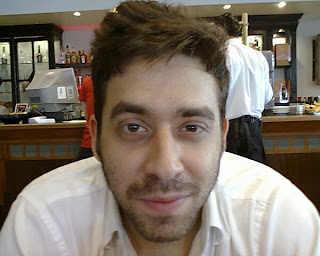He was busy writing when I
entered the café and walked up to his table hesitantly. “Are you David Maler,
the theater director?” We had agreed to meet in the La Paz bar-café in Buenos Aires,
still a hang-out for artists and egg-heads. The subject? “American Dreams and
an Elephant” and the more evasive subject of theater, how actors are like
magicians because they create something from nothing.
“My name is David
Maler, I’m 23 years old and I’m from the Dominican Republic. I was born in a
little fisherman’s village on the southeast of the island. A very picturesque
place, no more than 500 people, and my father is an artist and maybe that’s why
he chose the place—no electricity, no television, no phones. I grew up there
but also travelled around with him and so I have lived in very
contrasting environments.
“And then somewhere
along the line theater appeared...”
“I was a pretty
lazy student, really laid back, but then the school would put on its year end shows and that was the only time I would work as hard as I could. It
seemed to come naturally. Then when I was 16 I did a musical—Jesus Christ
Superstar. It wasn’t a big production but I would drive two hours to take
lessons with a singing coach. And I realized that that was the first time I really
wanted to work for something.
“What kind of
theater inspires you?”
“Before I graduated
I came across through a friend of my father’s an amazing theater coach, called Jack
Walter, from the Actor’s Studio in New York. He comes from Method and studied
with Lee Strasberg and other key figures in the theater world but developed his
own approach. So that’s my way to work usually but this play—American Dreams
and an Elephant, being played at the El Tinglado teatro in Buenos Aires City—is
diffirent because it is a comedy. I do love Russian playwrites though, for all
of the dark turmoil that appears in their plays.
“Perhaps we might
refer also to the internal effect that theater has had on you.”
“We all grow up
supressing so many things, but theater has that almost therapeutic effect of allowing
those emotions to flow that you have been holding back for so long, although I
have always felt that the line should be very clearly established between
psychology and theater.”
“Where did the idea
for the show come from?”
“Well, Dennis
Weisbrot, the author, went to see a play I was acting in. Later on we began
working together. But initially “American Dreams” was directed by a woman. A
problem appeared concerning the need to adapt the play. It could be
presented in any city at any time, but the danger is the possible loss of the
strong criticism it includes for U.S. society. Anyway, I dropped out of the project for a
while but kept in touch with Dennis. Five or six months ago he called me up and
said listen I want to start this up again and asked me if I wanted to direct
the play. I re-read it and, well, I was a bit nervious because I had never
directed a play before that. So I read it and re-read it until five O’Clock in
the morning and then called him up and said: “I’ll do it.” That’s how it all
started. “
“How did you go
about it?”
“Initially the idea
was that everyone would direct his own sketch. But there had to be someone to
make sure that a line went through the whole thing. It’s difficult because the
show is not lineal: you have four sketches, each completely different. I
received a lot of help from the actors telling me how they saw their roles in
each scene.”
“In your opinion
what is the underlying idea in the four sketches?”
“It has to due with
the processes that are taking place in U.S. society, so if you are
northamerican you can relate to it more but I think a lot of the processes are happening all over the world, globalization, alienation,
what is happening at the workplace, information, technology, the effects of war
and what that is going to mean for future generations. The show touches on all
of these taboo things which are there but we don’t really talk about them. “
“The show appears
to have many different messages, not only what is in the script...”
“It isn’t just
saying the lines but how you say them. The characters are very cartoonish. Physically
we had to make clear to the audience what kind of characters we are dealing
with. That called for over the top actions, and stress on physical actions, on small
details, on the movement of the hand, how the actors look at the audience, pauses, silences. As they
say, the eyes are the windows of the soul and in this case it was extremely
important to seek complicity with the audience in circumstances that are very
uncomfortable. It is as if the characters were seeking approval. One thing that
appears frequently in the sketches is ritual, how actions are repeated robot
like and that is a good technique for comedy.”
David
Maler, director of “American Dreams and an Elephant.”
On stage Wednesdays at 8pm at
the El Tinglado teatro in Buenos Aires City, 948 Mario Bravo. Booking: 4863 1188.

No hay comentarios.:
Publicar un comentario